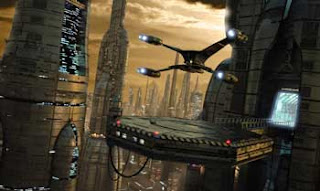Witing Science Fiction Part 1
This blog is long and I decided to brake it up into two parts.
For well over 100 years, perusers have gone to sci-fi to discover enormous and strong thoughts rejuvenated. Furthermore, the science fiction sort has conveyed with a consistent overflowing of stupendous ideas. As an essayist of sci-fi, you'll need to invest some energy pondering what makes your story unique and uncommon. I allude to this as the "huge thought."
Science fiction perusers will anticipate it from you. They'll search for it inside the primary section, much of the time. So you would do well to deliver.The most ideal approach to figure out this idea is to peruse loads of sci-fi books. I've imagined ten remarkable works here on this page, and that lone starts to expose what's underneath. Consider the last book you truly delighted in. Did it's anything but a major thought or reason? I'm willing to wager it did.
Along these lines, composing a decent sci-fi novel beginnings with the thought. That is the seed from which the story develops. It doesn't end there, obviously. However, the enormous thought, the novel reason that will separate your work, must be there from the beginning.
The large thought is less significant. In "scholarly" or standard fiction, for instance, it very well may be sufficient to have intriguing characters face difficulties and change or develop because of them. Yet, with a science fiction novel (and with speculative fiction by and large), you need to convey something else. You need a major thought.
Try not to misunderstand me: It's additionally essential to have fascinating characters who face difficulties that change and shape them. That is useful for all sorts. That is the center element of any great story. In any case, sci-fi needs a major thought, on top of those different fixings.
Here's the uplifting news. The science fiction type is staggeringly assorted. It's anything but an interminable exhibit of ways and potential outcomes, any of which could prompt a decent book. That is incompletely why it's quite possibly the most mainstream types of fiction today. There's consistently space for advancement and new thoughts.
Sci-fi perusers are pretty much as different as the books they read. Everybody has various assumptions when they start another novel. However, with regards to science fiction, perusers will in general search for explicit components when they get a novel.
For instance, take the entire "hard" versus "delicate" thing:
• Hard sci-fi gets into the "stray pieces" of whatever science shows up in the story. Hard science fiction stories frequently manage some part of stargazing, science, science or physical science.
• Soft science fiction is normally more worried about the cultural and human parts of the story, investing less energy in the specialized or logical. These accounts regularly highlight the "milder" sciences like humanities and brain research.
Some science fiction perusers will readily devour books across the whole range, while others like to remain inside a smaller path.
How about we see Andy Weir's tale The Martian. I believe this book to be "hard" sci-fi, on the grounds that it for the most part manages critical thinking of a logical sort. It requests to be individuals with an interest in material science, designing, and so on It bids to left brained individuals
Eventually, you need to recount the story that is consuming inside you, the one shouting to get out. You must be consistent with yourself and to the story you need to tell. That is above all else.
Simultaneously, it assists with pondering the sorts of perusers you need to draw in, and the assumptions they may have. This can be cultivated, to some extent, by perusing generally inside your picked subgenre. You should know what's out there, so you can ensure your own stir has the right stuff.
The meaning of sci-fi can shift contingent upon who you inquire. Be that as it may, most perusers and journalists concede to a certain something. A decent science fiction story or novel needs to highlight science such that is essential to the story. That is the absolute minimum prerequisite and definition.
The story doesn't need to be "about" the science. Indeed, it presumably shouldn't. It ought to likely be about the principle character(s) you've made. It ought to be about what those characters need, and the colossal snags they face in quest for their objectives. That is the core of the story.
Yet, this is sci-fi we're discussing here. So the logical segment must be somehow or another, regardless of whether it's behind the scenes.
At their center, books are about characters and the things that happen to them. This is valid for sci-fi, dream, sentiment, secret and different sorts too. We read stories to find new universes and to associate with individuals who occupy them. We join the characters on their excursions, pulling for them en route. This is something to remember, as you set off to compose a sci-fi novel.
Indeed "hard" science fiction books, those that dive further into the logical viewpoints, must be relatable. As perusers, we may not completely comprehend the intricacies of interplanetary travel, or fake general knowledge. Yet, we do understand being human. We have long stretches of involvement with that division. So while we may battle to stay aware of the science now and again, we can generally identify with the human side of the story.




Comments
Post a Comment